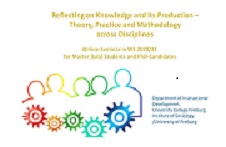Lehre
Aktuelle Lehrveranstaltungen in SoSe 2024
Einführung in die quantitativen Methoden I: Sozialwissenschaftliche Umfragen designen und auswerten – Teil I
Will man soziale Umfragedaten nutzen oder diese selber produzieren, so sollte man mögliche Probleme und gar Manipulationsmöglichkeiten kennen, die mit dem Studiendesign, der Fragebogenkonstruktion, der Präsentation und Interpretation von Studienergebnissen verbunden sein können. Im Forschungspraktikum I werden wir uns mit den wesentlichen Grundlagen, Qualitätskriterien aber auch mit den Herausforderungen einer Umfrage befassen und der praxisnahen Methodenanwendung. Ziel ist es, neben der praktischen Methodenaneignung, das Bewusstsein für die sozialen Wirklichkeitskonstruktionen zu schärfen, welche durch die methodischen Ermessenspielräume entstehen, als auch für deren Konsequenzen für die Umfragequalität.
Co-Teaching

Lehrveranstaltungen vergangener Semester

